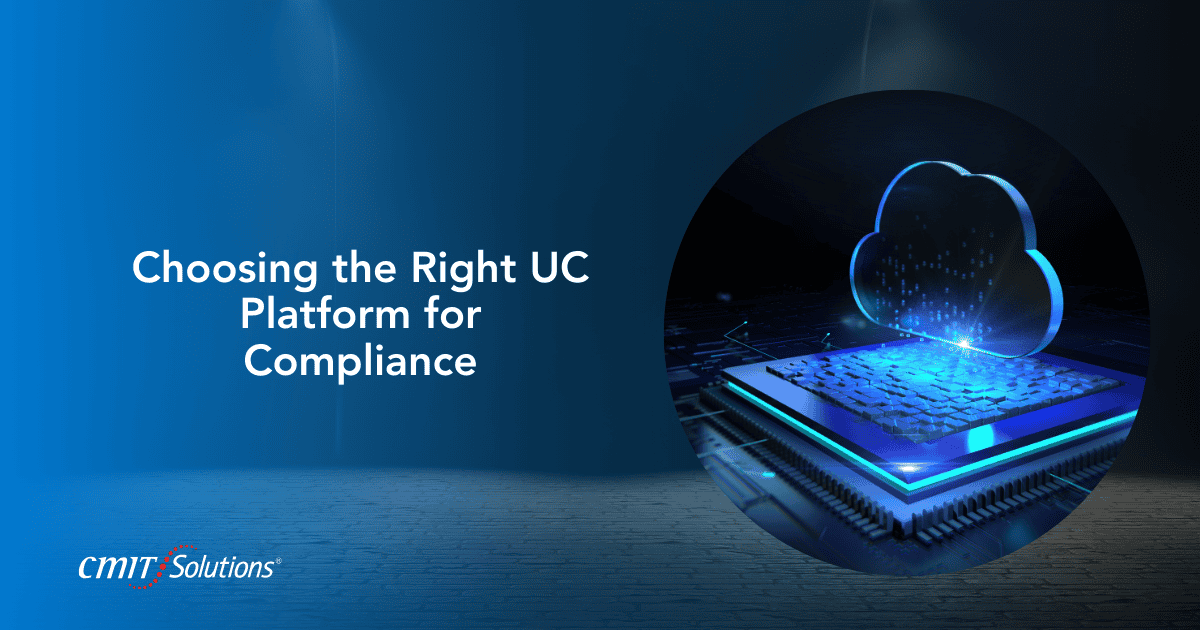In today’s increasingly digital and interconnected business landscape, communication is the backbone of successful operations. With remote work, distributed teams, and cloud-based platforms becoming the norm, businesses need efficient and secure collaboration tools. However, ensuring that these communication channels meet regulatory compliance standards is more crucial than ever. In industries like healthcare, finance, and manufacturing, the stakes are particularly high, with data protection regulations such as HIPAA and GDPR mandating strict controls over how sensitive information is managed.
Unified Communication (UC) platforms have emerged as the key to streamlined business collaboration. But as businesses embrace these tools, ensuring compliance with security protocols is essential to protect sensitive data and maintain operational integrity. In this blog, we’ll explore how unified communication solutions meet compliance requirements, and how businesses can ensure secure collaboration in the digital era.
What is Unified Communication?
Unified Communication (UC) refers to the integration of various communication tools—such as instant messaging, video conferencing, voice calls, and file sharing—into a single platform. UC solutions allow teams to communicate seamlessly across different channels, increasing efficiency and enabling real-time collaboration. Platforms like Microsoft Teams, Zoom, and Slack are widely used in businesses to enhance communication and productivity.
However, with the integration of these tools comes the challenge of ensuring data security. As businesses share files, conduct meetings, and manage projects via these platforms, sensitive data can be vulnerable to cyber threats if not properly secured. Ensuring that these platforms comply with industry standards is crucial for businesses that handle confidential data.
The Intersection of Unified Communication and Compliance
Compliance is a major concern for businesses that handle sensitive customer or employee data. Regulations like HIPAA, GDPR, and PCI-DSS have strict requirements for data protection, mandating how personal and financial information is stored, shared, and accessed. For example, GDPR requires that businesses take adequate measures to protect personal data from unauthorized access, while HIPAA ensures that healthcare organizations safeguard patient information.
Unified Communication platforms must adhere to these regulations, ensuring that all communication and collaboration activities are secure. This includes:
- Data encryption: UC platforms must encrypt data in transit and at rest to prevent unauthorized access.
- Access controls: Businesses must ensure that only authorized personnel can access sensitive data shared via UC platforms.
- Audit trails: UC solutions should provide detailed logs and reports that document communication activities for compliance audits.
For example, as noted in navigating public and private networking zones, businesses leveraging cloud-based UC platforms need to secure both public and private networks to prevent data breaches.
Ensuring Secure Collaboration in Unified Communication
While unified communication enhances collaboration, security must remain a priority to prevent data breaches and ensure compliance. Here are some key strategies for ensuring secure collaboration on UC platforms:
1. Implementing Multi-Factor Authentication (MFA)
Multi-factor authentication adds an additional layer of security by requiring users to verify their identity using two or more authentication methods before accessing a system. This reduces the risk of unauthorized access to sensitive communication channels. For example, implementing multi-factor authentication across UC platforms ensures that only authorized users can join meetings or access shared files.
2. Data Encryption
Encrypting communication data is essential for protecting sensitive information from unauthorized access. UC platforms should use end-to-end encryption to ensure that all messages, voice calls, and video conferences remain private. Businesses should also ensure that files shared via UC platforms are encrypted both in transit and at rest. Encryption plays a key role in complying with regulations like GDPR, which mandates robust data protection measures.
3. Regular Compliance Audits
Compliance audits are an essential part of ensuring that your UC platform meets industry standards. By conducting regular audits, businesses can identify vulnerabilities in their communication channels and address them before they lead to security breaches. Managed IT services can help streamline the audit process, providing expertise in IT compliance and ensuring that your communication tools adhere to regulatory requirements. Understanding compliance audits is crucial for maintaining operational security.
4. Proactive Threat Detection
To ensure secure communication, businesses must stay ahead of potential cyber threats. Proactive threat detection tools, such as Security Information and Event Management (SIEM), monitor communication activities for suspicious behavior in real time. This allows businesses to respond to potential threats before they escalate into security incidents. Proactive threat detection can mitigate the risk of data breaches and ensure continuous compliance with security protocols.
5. Effective Data Backup Strategies
Compliance regulations often require businesses to have reliable data backup and recovery strategies. In the event of a system failure or data breach, having a reliable backup ensures that critical communication data can be restored. Managed IT services can help businesses implement secure backup solutions for their UC platforms, ensuring that all files and communications are regularly backed up. Reliable data backup strategies provide peace of mind, knowing that critical information is always recoverable.
Choosing the Right UC Platform for Compliance
Not all UC platforms are created equal, and choosing the right platform for your business is essential for ensuring compliance and security. When selecting a UC solution, businesses should consider the following factors:
- Security features: Look for platforms that offer advanced security features, such as end-to-end encryption, MFA, and access controls. Platforms like Microsoft Teams and Slack offer robust security features that meet the needs of businesses handling sensitive data. Harnessing Microsoft Copilot can also add efficiency while maintaining security.
- Compliance support: Choose a UC platform that is designed to meet regulatory requirements. Platforms that offer built-in compliance features—such as HIPAA compliance for healthcare businesses or GDPR compliance for European operations—are essential for businesses operating in highly regulated industries.
- Cloud integration: Many UC platforms are cloud-based, allowing businesses to collaborate seamlessly from any location. However, it’s important to ensure that the platform’s cloud infrastructure is secure and compliant with data protection regulations. Effective cloud migration strategies can help businesses transition to cloud-based UC platforms while maintaining compliance.
The Role of Managed IT Services in Secure UC Solutions
Navigating the complexities of compliance and security in unified communication can be challenging. Managed IT services provide the expertise needed to ensure that your UC platforms meet both security and compliance standards. From conducting regular audits to implementing advanced security features, managed IT providers offer comprehensive support for your communication infrastructure.
For Charleston businesses, partnering with a trusted managed IT provider like CMIT Solutions ensures that your communication tools remain secure, compliant, and operationally efficient. By outsourcing IT services, businesses gain access to advanced tools and technologies without the burden of managing security in-house.
Conclusion
As businesses continue to embrace digital collaboration tools, ensuring that unified communication meets compliance standards is more important than ever. Unified Communication platforms offer immense benefits for productivity and collaboration, but they also introduce security risks if not properly managed. By integrating compliance measures such as data encryption, multi-factor authentication, and proactive threat detection, businesses can create a secure environment for communication.
For Charleston businesses, partnering with a managed IT service provider like CMIT Solutions ensures that unified communication solutions not only improve collaboration but also protect sensitive data and ensure compliance with industry regulations. Whether you’re implementing new communication tools or enhancing existing systems, taking a proactive approach to security will help your business thrive in the digital era.






